In Norse mythology, Odin rules, and right next to him stands his wife Frigg, Aesir goddess of marriage and fertility. Queen of the Aesir gods, she is an interesting, and somewhat mysterious figure and I believe she doesn’t necessarily get as much attention as she deserves.
As the wife of Odin, Frigg is a central character in many stories, but there are few details passed down to us about her background. When you add in the fact that Norse mythology evolved over time, I think you have the explanation for some of the theories about her today.
Before I dive into this article, I want to point out at the start that I don’t belive in the discussion of whether or not Frigg and Freyja were the same. If you dissect any mythology you can likely trace gods back to who ever came before them. My understanding is that througout the Viking Age, particularly in Norway and Sweden, Frigg and Freyja were two wholly different goddesses. With that out of the way, the following is what I believe is true about Frigg.
Frigg Key Facts
| Parents | Fjörgynn |
| Partners | Odin |
| Siblings | Not specified |
| Offspring | Baldur, Höðr, Hermod, and Vali is a step-son |
| Tribe | Aesir |
| Old Norse name | Frigg |
| Other names | Anglicized as Frigga |
| Dwelling | Fensalir (Old Norse; hall of the marsh) |
| The God of | Love, fertility, and marriage |
| Ass. Animal | Falcon (in falcon-feathered cloak) |
Name and Etymology
The names Frigg (Old Norse), Frīja (Old High German), Frīg (Old English), Frīa (Old Frisian), and Frī (Old Saxon) are all cognates, meaning they share a linguistic origin. These names originate from the Proto-Germanic feminine noun *Frijjō. This term again has evolved from the adjective *frijaz, which means ‘free’.
In a society structured around clans, the term ‘free’ was derived from the concept of being ‘related’. Intriguingly, the name’s etymology is closely related to the Sanskrit word priyā and the Avestan term fryā, both signifying ‘own, dear, beloved’.
To be honest, and at least to my modern Norwegian ears, her name sounds kinda harsh and not that melodic. Way back in time though, Frigg might have carried a beautiful meaning, encapsulating both love and freeedom found in belonging to a clan, or group.
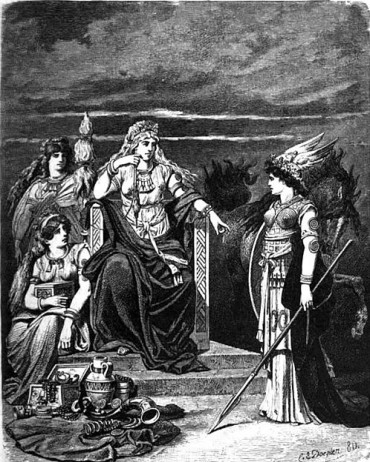
In modern times, some editors have added an -a suffix to the name, resulting in the form Frigga. This not only denotes femininity but also differentiates the goddess from the English word “frig”. It’s worth noting that several place names in present-day Norway and Sweden reference Frigg, though her name is conspicuously absent in recorded place names in Denmark. I believe this might in large part be explained by how Norse mythology evolved in the time just before the Viking Age.
Kennings
In the Skáldskaparmál, a section of the Prose Edda, Frigg is described in various ways that offer insights into her role and significance in Norse mythology. She is referred to as the “Daughter of Fjörgynn”, the “Wife of Odin”, and the “Mother of Baldr”. Additionally, she’s called the “Co-Wife of Jörd and Rindr and Gunnlöd and Grídr”, the “Mother-in-law of Nanna”, and the “Lady of the Aesir and Ásynjur”. She’s also recognized as the “Mistress of Fulla”, of the “Hawk-Plumage”, and of “Fensalir”.
Ancient roots
The origins of Frigg and her role as a goddess have been subjects of scholarly discussions and debates. Some scholars believe that Frigg and the goddess Freyja might have been perceived as a single deity during the Proto-Germanic period (this theory is known as the Frigg and Freyja common origin hypothesis).
While the name of the Vanir group of gods, to which Freyja belongs, is unique to Scandinavia, the name Frigg is also found among the West Germanic peoples. However, evidence supporting the existence of a common Germanic goddess from which Freyja emerged is scant.
I have often found that as you dig deeper into the gods and the myths, you realize how much is unknown. We might never know where Frigg as a goddess “came from”, but that adds to the fascination I think. Furthermore, I am writing about Norse mythology in the Viking Age. I kind of think it unnecessarily muddies the waters if we are going down every rabbit hole of possible origins dating back far before.
Frigg’s Day – Friday
Interestingly, the origins of the English weekday name “Friday” is in honor of Frigg. The term “Friday” is derived from Old English “Frīġedæġ”, which translates to ‘day of Frig’. This name is a testament to the reverence and significance attributed to the goddess Frigg, not only in the Viking Age, but also the influence Old Norse, or Proto-Germanic have had on the English language.
The term “Frjádagr” from Old Norse, which was borrowed from a West Germanic language, also points to the same origins. Both these names can be traced back to the Late Proto-Germanic term “*Frijjōdag”, meaning ‘Day of Frijjō’. Interestingly, while the Old English theonym “Frīg” is primarily found in the context of the weekday, it also appears as a common noun in “frīg”, symbolizing ‘love, affections, or embraces’ in poetic contexts.
Adding another layer to the intrigue surrounding Frigg and Freyja’s possible shared origins is the Old Norse term “Freyjudagr”. This term, a rarer synonym for “Frjádagr”, incorporates “Freyja” into the name of the day, suggesting a blending or interchangeability of the two goddesses in ancient traditions. The replacement of the initial element with the genitive of “Freyja” in “Freyjudagr” further fuels the debate about their intertwined identities and roles in Norse mythology. I am stearing clear of this though, so two separate goddesses!
Frigg Origins
Frigg is predominantly known as an Aesir goddess, and she holds a prominent position within this tribe as the queen and wife of Odin. The Aesir are one of the two main tribes of deities in Norse mythology, the other being the Vanir.
Born to Fjörgynn, a figure whose details remain shrouded in mystery, Frigg’s early life is largely unknown to us. However, her prominence in the pantheon suggests a lineage of great importance. Surely the Vikings and their skalds had a deep understanding of where Frigg came from, but sadly that part of her story has been lost to us.
Fjörgyn (Jord) and Fjörgynn (Frigg’s father)
In Norse mythology, Fjörgyn, also known as Jörð (which translates to ‘earth’ in Old Norse), embodies the personification of the earth. She holds the esteemed position of being the mother of Thor, the thunder god, son of Odin. Intriguingly, the masculine counterpart of this name, Fjörgynn (note the extra -n), is said to be the father of the goddess Frigg.
Both these names, Fjörgyn and Fjörgynn pop up in both the Poetic- as well as the Prose Edda. The origins and interpretations of these names have piqued the interest of scholars, leading to a plethora of theories and extensive academic discussions. Again, personally I think it is easiest, for our understanding of the Viking Age Frigg, to say that Frigg comes from a line early, possibly primordial beings, likely jötun.
Frigg Family and Relationships
Frigg’s relationships, both familial and romantic, play a pivotal role in shaping the narratives of Norse mythology. As the wife of Odin, their union symbolized the confluence of power and wisdom. Together, they ruled Asgard, making decisions that would impact both gods and mortals alike. When I say ‘together’ I actually mean that I don’t think Frigg was the kind of wife to pipe down and stay silent. The old sagas relate several instances when she let her meaning be heard.
Odin
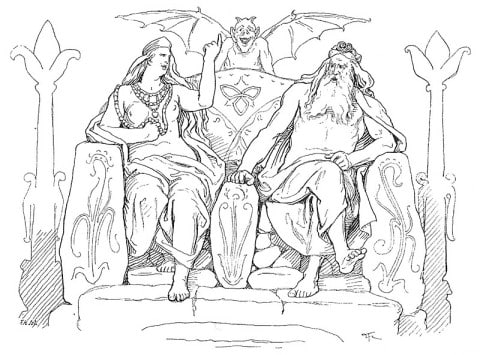
Frigg’s relationship with Odin is one of mutual respect and deep affection. Their bond is often depicted as harmonious, with both deities complementing each other’s strengths. While Odin sought knowledge and often wandered in his quests, Frigg remained in Asgard, using her prophetic abilities to foresee events and guide the gods. Having said that though, I have to add that Frigg certainly didn’t pull her punches. Odin certainly sought her advice in different matters, but she also conspired to have him captured and tortured all because she didn’t want to loose a bet with him as told in Grimnismál.
Children
Frigg’s maternal role in Norse mythology is both profound and poignant, with each of her sons having distinct narratives that shape the overarching mythos. Baldr, often described as the most beloved among the gods, is renowned for his purity, beauty, and tragic fate. His death, foreseen by Frigg, set in motion a series of events leading to the prophesied end, Ragnarok.
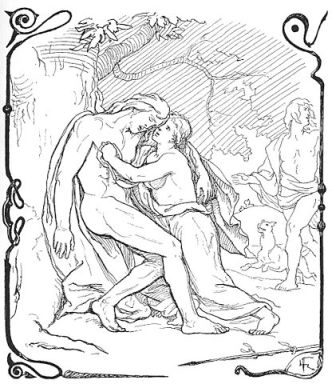
Hermod, another of Frigg’s sons, is best known for his brave journey to the underworld in an attempt to rescue his deceased brother, Baldr. His tale is one of courage, showcasing the lengths to which the gods would go for their kin. Höðr, often depicted in a tragic light, played an unwitting role in Baldr’s death, manipulated by the cunning of Loki.
Additionally, while not her biological son, Vali is associated with Frigg, being named her stepson. Recognized as her stepson, one of his kennings in the Skáldskaparmál refers to him as the “Stepson of Frigg.” Vali’s birth was swift and purposeful, born to avenge Baldr’s death by confronting Höðr. Each of these sons, whether by birth or association, further emphasizes Frigg’s central role as a mother figure within the Norse pantheon.
Frigg Roles And Responsibilities
Frigg, as the queen of the Aesir and the goddess of love and marriage, held a position of immense influence and reverence within the Norse pantheon. Her responsibilities extended beyond the divine realm, touching the lives of mortals and gods alike. She had the powers of a völva, a seeress. Possessing the ability to divine prophecies and possibly see glimpses of the future. This unique gift made her an invaluable source of wisdom and guidance, especially in matters concerning the fate of the gods and the world.
However, it’s intriguing to note that despite her prophetic abilities, Odin, on at least two occasions, sought the insights of other völvas rather than consulting Frigg. This choice raises questions about the dynamics of their relationship and the specific roles each deity played in the grand scheme of Norse cosmology.
As a mother and step-mother to several central figures in Norse mythology, Frigg’s maternal instincts and protective nature are evident in various tales. Her deep connections with her children, especially Baldr, and her position as the “highest-ranking” among the goddesses, further underscore her significance and multifaceted role in the myths.
Depiction And Characteristics
Frigg’s portrayal in Norse myths paints a picture of a wise, loving, and sometimes sorrowful deity. Her deep love for her children, especially Baldur, is evident in the tales that recount his tragic death and her attempts to prevent it. This maternal instinct, combined with her role as Odin’s consort, positions her as a nurturing yet powerful figure.
Her personality, as gleaned from the myths, is multifaceted. While she embodies love and fertility, she also possesses the wisdom and foresight typical of a queen. Her interactions with other gods and mortals showcase her diplomatic skills, often mediating disputes and offering counsel.
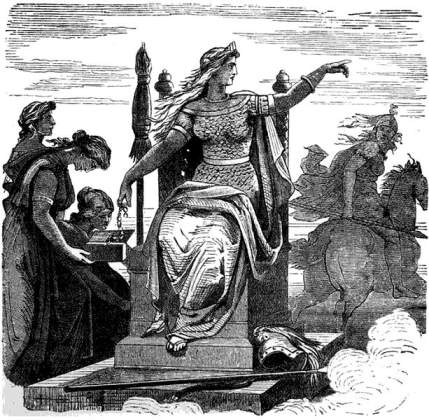
Despite her many responsibilities, Frigg’s character is not without moments of vulnerability. The loss of Baldr, in particular, reveals a depth of emotion that resonates with anyone familiar with the pain of loss.
Frigg Symbols, Artifacts or Animals
Frigg, with her multifaceted nature, is associated with a myriad of symbols and artifacts that resonate deeply within Norse mythology and beyond. One of her most iconic symbols is the falcon, especially when she wears her magical falcon-feathered cloak. This cloak not only allows her to traverse the nine realms swiftly but also grants her the ability to transform into a falcon, emphasizing her deep connection to the avian world.
The spindle and distaff, tools integral to spinning, are also emblematic of Frigg. Now, I was quite surprised to learn about the pre-Christian association of the constellation Orion’s belt with “Frigg’s Distaff” (Friggerocken) in Scandinavia. Being Norwegian, I had never come across this association before, and it might very well be more prevalent in Swedish traditions.
Interestingly, I’ve stumbled upon mentions of Frigg being linked to the stork. I must admit, I can’t find a solid source for this, and it’s left me a bit puzzled. Could this association be a later addition? Or might it hint at the origins of the modern belief of storks delivering babies? Given Frigg’s dominion over love, fertility, and marriage, this connection, even if tenuous, is fascinating.
In essence, whether it’s the falcon that allows her to soar through the skies, the spindle and distaff that might connect her to the stars in ways I hadn’t known, or the elusive stork association that I’m still trying to pin down, each symbol and artifact related to Frigg offers a deeper dive into her role and significance in Norse mythology.
Fensalir: The Mysterious Dwelling of Frigg
Fensalir, translated as “Fen Halls” from Old Norse, is the renowned dwelling of the goddess Frigg. The etymology of Fensalir is intriguing, derived from “Fen,” meaning a bog or wetland, and “salir,” denoting halls. This has led to much speculation about the nature and location of Frigg’s abode. Would a goddess of her stature reside near a bog?
While some argue against the idea of Frigg’s grand hall being situated close to a wetland, the connection is not only plausible but also deeply symbolic. In the Viking Age, bogs were perceived as portals to the realm of the dead. Numerous archaeological finds, from buried treasures to human remains, attest to the significance of bogs as both burial sites and places of ritualistic importance. The Vikings believed that treasures buried in the earth could be accessed in the afterlife, further emphasizing the spiritual significance of these wetlands.
Given Frigg’s role as a völva, a seeress with the ability to perceive the threads of fate and the mysteries of the universe, her association with such a potent ‘otherworldly portal’ is compelling. Fensalir, whether literally beside a fen or symbolically linked to it, underscores Frigg’s deep connection to the realms beyond the living and her profound insights into life, death, and destiny.
Play Fun Norse Quiz
Is this article making you even more curious about Norse gods and goddesses? You can satisfy your curiosity by playing a fun Norse mythology quiz. This way, you can test your knowledge about Norse gods and goddesses, as well as fill in some gaps. Good luck and have fun playing!
How much do you know about Frigg’s relationship with Odin? Can you name all of their children? Play this game and find out!
Don’t forget to try our other games as well!
Myths about Frigg
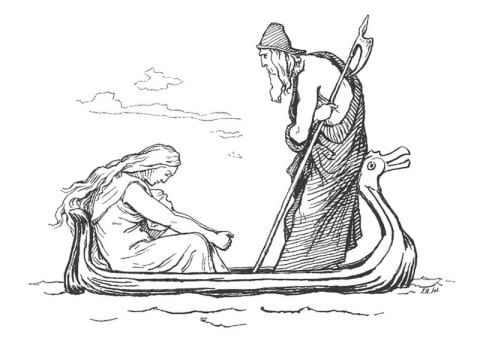
Frigg’s tales are interwoven with the larger narrative of Norse mythology, and her roles in various myths highlight her significance and the depth of her character.
Vafthrudnirsmal: Seeking Frigg’s Counsel
In the mythic poem “Vafthrudnirsmal,” Odin contemplates a journey to challenge the wise giant Vafthrudnir in a contest of knowledge. Before embarking on this perilous quest, he seeks the counsel of Frigg. Her wisdom and foresight are evident as she advises against the journey, sensing the potential dangers that lie ahead. Although Odin ultimately chooses to proceed, the episode underscores the weight he places on Frigg’s advice, showcasing the mutual respect and trust in their relationship.
Grimnismal: A Divine Bet and Its Consequences
The “Grimnismal” offers a more playful, yet consequential, glimpse into Frigg’s relationship with Odin. The two gods, observing the mortal realm from their vantage point on Hlidksjalf, make a wager regarding the fate of two mortal brothers, Agnar and Geirrod. To ensure her victory in the bet, Frigg sends her handmaiden Fulla to warn Geirrod of a disguised Odin’s impending visit. This warning leads to Odin’s capture and torture, all stemming from a seemingly innocent bet between the divine couple. The tale not only highlights Frigg’s cunning but also showcases the dynamics of her relationship with Odin, where love, competition, and mischief intertwine.
Lokasenna: Frigg’s Defense
In the “Lokasenna,” the trickster god Loki crashes a feast of the gods and begins to insult each deity in turn. When he directs his sharp tongue towards Frigg, she defends both herself and her son Baldr, showcasing her protective maternal instincts. Her interactions with Loki in this setting reveal her dignity and resilience in the face of adversity.
Baldr’s Dreams: A Mother’s Desperation
Perhaps one of the most poignant tales involving Frigg revolves around her son Baldr’s ominous dreams. Foreseeing his tragic death, Frigg goes to great lengths to prevent the prophecy from coming true. She extracts promises from every object in the world, ensuring they would not harm her beloved son. However, the overlooked mistletoe becomes the instrument of Baldr’s demise. This narrative underscores Frigg’s deep love for her children and the lengths she would go to protect them, even when faced with the inescapable threads of fate.
Through these myths, Frigg emerges as a multifaceted deity, embodying wisdom, love, cunning, and determination. Her roles in these tales provide a window into the world of the gods, their relationships, and the intricate web of fate that binds them.
Frigg and Freyja: Two Faces of the Same Goddess?
Ok, to shed some light of the possible controversay concerning her background, here is a short version of the Frigg vs. Freyja argument.
The intricate tapestry of Norse mythology is replete with overlapping themes, shared origins, and intertwined tales. Among the most debated topics in this realm is the relationship between Frigg and Freyja. They are both prominent goddesses who, at first glance, might appear to be distinct entities. However, delving deeper into their origins and characteristics reveals a more complex picture. Moreover, you come to see that they might have once been perceived as facets of the same divine figure.
The roots of this notion can be traced back to Frija. She was a Proto-Germanic goddess believed to be the precursor of both Freyja and Frigg. This shared ancestry hints at a time when the distinctions between the two deities might have been more fluid, evolving over time as beliefs, stories, and cultures merged and diverged.
Adding to this conundrum is the striking similarity between the names of their respective husbands. Freyja’s spouse, Óðr, shares an almost identical name with Odin (known as Óðinn in Old Norse). The meanings of their names further intertwine their narratives. Óðr translates to “ecstasy, inspiration, furor,” while Óðinn is an extension of this, embodying the essence of inspiration and wanderlust. The tales of Óðr’s long journeys and Freyja’s tears of red gold during his absences mirror Odin’s frequent wanderings across the Nine Worlds. Such parallels cannot be mere coincidences and point towards a deeper connection between the two goddesses and their consorts.
Freyja is uniquely Scandinavian
The name “Freyja” and the term “Vanir” (the tribe of gods which Freyja belongs) are unique to Scandinavian sources. In contrast, Frigg’s name has wider geographical roots. It appears as Frīg in Old English and Frīja in Old High German, both stemming from the Proto-Germanic *Frijjō. This broader recognition of Frigg, juxtaposed with the localized references to Freyja, raises intriguing questions. Could Freyja’s distinct identity have evolved from a more universally recognized Frigg-like figure? Or perhaps the scarcity of records outside the North Germanic tradition has obscured a once-common Germanic goddess from which both deities descended?
My personal belief is that Frigg and Freyja were perceived as separate entities at some juncture. However, the fluidity of myths and the passage of time make it challenging to draw definitive conclusions. What remains undeniable, however, is the rich tapestry of tales, beliefs, and debates these goddesses have inspired. Furthermore proving the depth and dynamism of Norse mythology.
Mentions in Ancient Texts
Poetic Edda
Völuspá
The Poetic Edda, a collection of Old Norse poems, frequently references Frigg. In “Völuspá,” her profound sorrow is captured:
“Frigg wept for the death of her son Baldr in Fensalir.”
Later in the poem, when discussing Odin’s impending demise, he’s referred to as the “beloved of Frigg.” This “second grief of Frigg” alludes to her initial sorrow over Baldr’s death.
Grímnismál
In “Grímnismál,” Frigg’s cunning and the dynamics of her relationship with Odin are evident. Observing mortals from Hliðskjálf, they wager on the fate of two brothers. To ensure her win, Frigg sends Fulla to warn of a disguised Odin’s arrival, leading to his capture. The poem describes their playful bet:
“The goddess Frigg and her husband, the god Odin, sit in Hliðskjálf and gaze into ‘all worlds’.”
Lokasenna
In “Lokasenna,” Loki, the trickster god, insults each deity. When he targets Frigg, she defends herself and Baldr, revealing her protective nature.
Prose Edda
Prologue
In the Prose Edda, Frigg’s prominence is evident. The Prologue describes her as Odin’s wife and mentions both possess the “gift of prophecy.”
Gylfaginning
In “Gylfaginning,” Frigg’s maternal instincts shine. Distraught over Baldr’s ominous dreams, she extracts promises from every object to prevent his death. Yet, the overlooked mistletoe becomes Baldr’s bane. This tale underscores her deep love and the inescapable threads of fate.
Skáldskaparmál
In “Skáldskaparmál,” the gods and goddesses hold a banquet in Asgard, with Frigg among the attending ásynjur.
Heimskringla and sagas
Ynglinga saga
In “Ynglinga saga,” part of the Heimskringla, Frigg’s loyalty to Odin is tested. During Odin’s absence, his brothers Vili and Vé divide his inheritance and share Frigg. However, upon Odin’s return, he reclaims his wife.
Völsunga saga
In “Völsunga saga,” Frigg’s compassion is evident. Hearing the prayers of king Rerir and his wife, who are unable to conceive, she informs Odin. The saga captures their plea:
“That lack displeased them both, and they fervently implored the gods that they might have a child.”
Frequently Asked Questions
Frigg was married to Odin, the chief of the Aesir and the ruler of Asgard. Their union was symbolic of the confluence of power and wisdom in the Norse pantheon.
Frigg is the queen of the Aesir and the goddess of love, fertility, and marriage. She played a pivotal role in both the divine and mortal realms, offering guidance, blessings, and prophecies.
Yes, she is often linked to the falcon, especially when she wears her falcon-feathered cloak. It allows her to transform and travel swiftly across realms.
Frigg was deeply sorrowed by the tragic death of her son, Baldur. She had tried to prevent his demise by extracting promises not to harm him from every object in the world.
One of the most notable artifacts associated with her is the falcon-feathered cloak. It grants her the ability to transform into a falcon. She’s also linked to the distaff, symbolizing her connection to fate-weaving.
Yes, Frigg had the gift of prophecy. She could see the threads of fate and had insights into events that were yet to unfold. Furthermore making her an invaluable advisor to Odin and the other gods.
Gallery
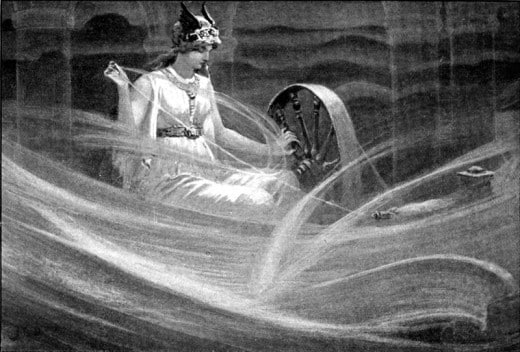 Frigga Spinning the Clouds
Frigga Spinning the Clouds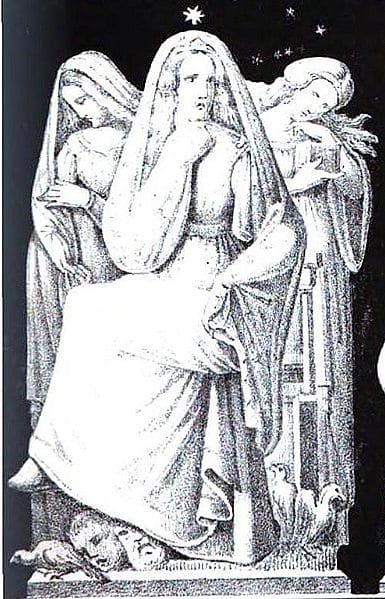 Frigga (1832) from Die Helden und Götter des Nordens
Frigga (1832) from Die Helden und Götter des Nordens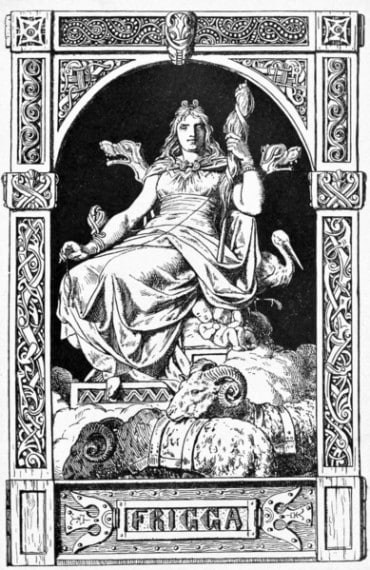 Frigg on her throne
Frigg on her throne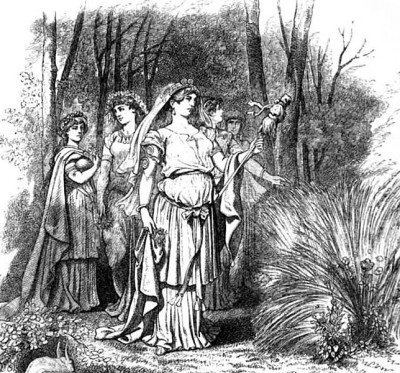 Frigga: The All-Knowing Queen of the Aesir in Norse Mythology
Frigga: The All-Knowing Queen of the Aesir in Norse Mythology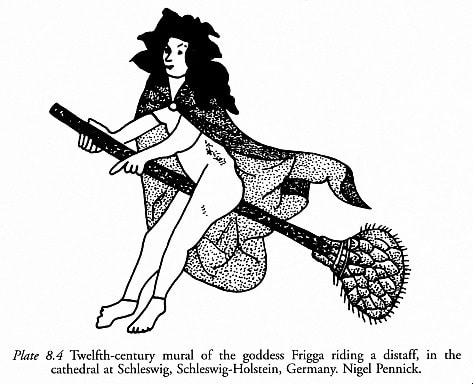 An illustration of what may be Frigg in the Schleswig Cathedral.
An illustration of what may be Frigg in the Schleswig Cathedral.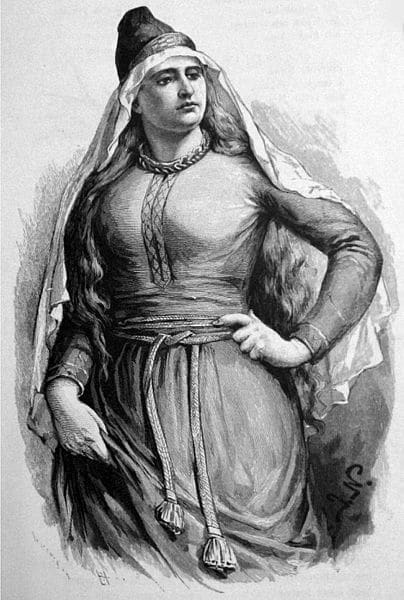 The engraving shows Frigg, wife of Odin.
The engraving shows Frigg, wife of Odin.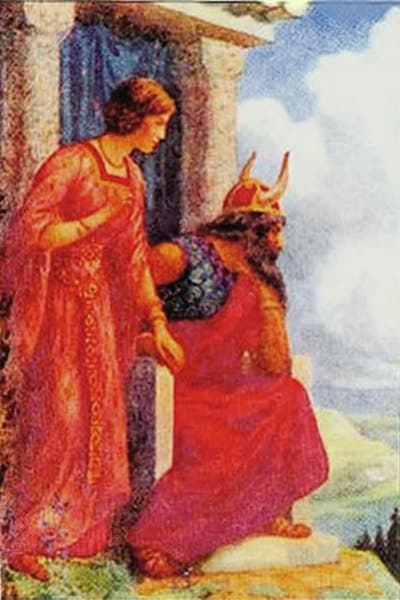 Odin and Frigg
Odin and Frigg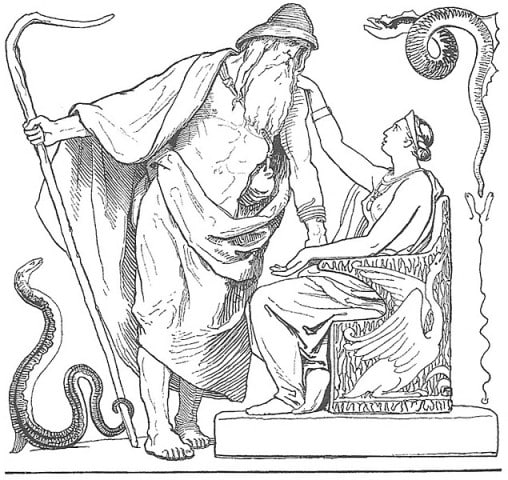 The god Odin and his wife, the goddess Frigg, from the beginning of the poem Vafþrúðnismál (1895) by Lorenz Frølich
The god Odin and his wife, the goddess Frigg, from the beginning of the poem Vafþrúðnismál (1895) by Lorenz Frølich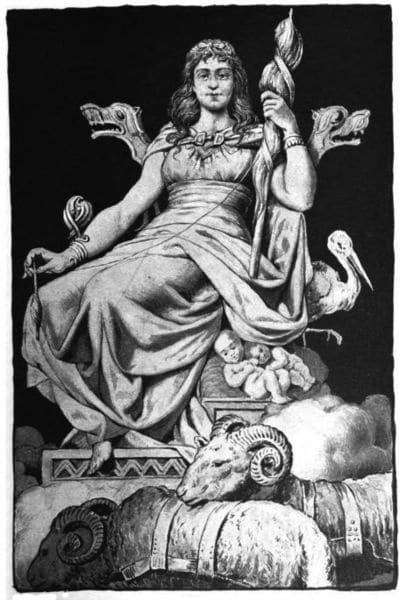 Frigga in Myths of Northern Lands by H A Guerber
Frigga in Myths of Northern Lands by H A Guerber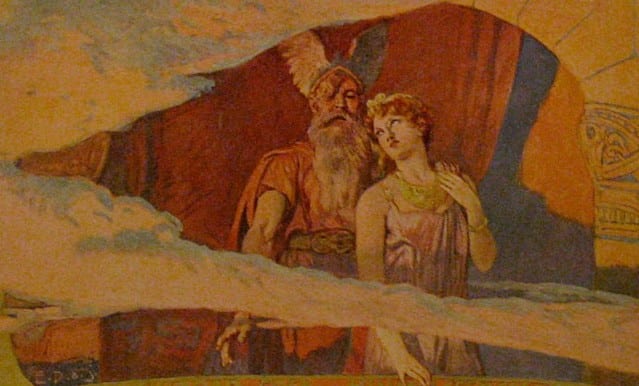 Godan and Frigg look down from their window in the heavens to the Winnili women in an illustration by Emil Doepler, 1905
Godan and Frigg look down from their window in the heavens to the Winnili women in an illustration by Emil Doepler, 1905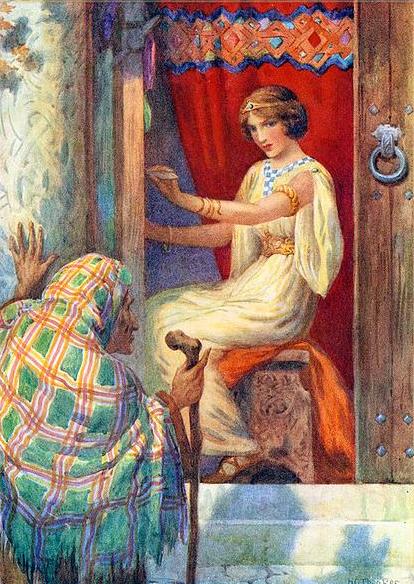 Frigga and the Beldame by Harry George Theaker
Frigga and the Beldame by Harry George Theaker
Featured Image Credit: Ludwig Pietsch (1824-1911), Public domain, via Wikimedia Commons

This article and this website are awesome. They are admired by a reader in the mid-South of the United States.
Thanks Jesse, much appreciated!
Marius